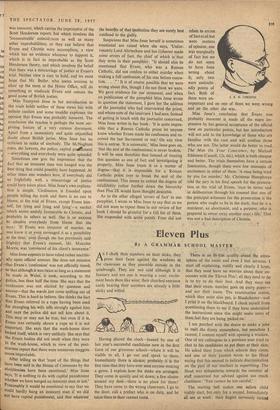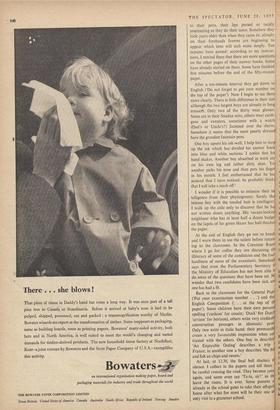Eleven Plus
11 y A GRAMMAR SCHOOL MASTER As I chalk their numbers on their desks, they press their faces against the windows in the classroom as they assemble outside in the quadrangle. They are not cold although it is January and not one is wearing a coat; excite- ment heats them like wine; their clutched entrance cards bearing their numbers are already a little sticky and wilted.
Having placed the clock—loaned by one of last year's successful candidates now in the first form of our grammar school—where it will be visible to all, I go out and speak to them. Immediately there is silence; probably it is the first time that-they have ever seen anyone wearing a gown. I explain how the desks are arranged. They come in quietly and sit down; a few cluster around my desk—there is no place for them They have come to the wrong classroom; I go to the door, call a prefect who is on duty, and he takes them to their correct room. There is an H-film quality about the atmo- sphere of the rooin and even I feel nervous. I start off explaining, mildly and clearly I hope, that they need have no worries about their en- counter with the 'Eleven Plus'; all they need to do is to try to do their best. And they must see that their exam. number goes on every paper— and not their name. The examination centre, which they must also put, is Blankchester—and I print it on the blackboard. I check myself from questioning them to see if they have understood the instructions since this might make some of them, feel they are being 'picked on.'
I am parched with the desire to make a joke to melt the frosty atmosphere, but somehow 1 cannot; I content myself with opening a window. One Of my colleagues in a previous year tried to chat to his candidates to put .them at their ease. He asked them from which schools they came, and one of their Parents wrote to the Head saying that this seemed to indicate discrimination on the pert of our teachers in supervising. The Head was sympathetic towards the member of staff concerned but advised against too much chattiness: 'You cannot be too careful.'
The starting bell makes one sallow child visibly start, but only for a second. Immediately all are at work : their fingers nervously nicked to their pens, their lips pursed or tacitly murmuring as they do their sums. Somehow they look years older than when they came in; already on their foreheads frowns are beginning to appear which time will etch more deeply. Ten minutes have passed; according to my instruc- tions, I remind them that there are more questions on the other pages of their answer books. Some have already started on them. Some have finished five minutes before the end of the fifty-minute paper.
After a ten-minute interval they get down to English ('Do not forget to put your number on the top of the paper'). Now I begin to see them more clearly. There is little difference in their size although the two largest boys are already in long trousett. Only two of the thirty wear glasses; Some are in their Sunday suits, others wear cardi- gans and sweaters, sometimes with a watch, (Dad's or Uncle's?) fastened over the sleeve. Somehow it seems that the most poorly dresse have the grandest fountain pens.
One boy upsets his ink-well; I help him to mo up the ink which has divided his answer boo into blue and white sections. I notice that hi hand shakes. Another boy absorbed in work sit on his own leg and rather dirty shoe. Ye another picks his nose and then puts his finge in his mouth. I feel embarrassed that he ha noticed that I have noticed; he probably think that I will take a mark off!
I wonder if it is possible to estimate their in telligence from their physiognomy. Surely thi intense boy with the tousled hair is intelligent I walk up the aisle only to discover that he ha not written down anything. His vacant-lookin neighbour who has at least half a dozen badge on the lapels of his green blazer has half-finishe the paper.
At the end of English they go out to break t and I warn them to use the toilets before return r ing to the classroom. In the Common Roon where I go for coffee they are discussing th illiteracy of some of the candidates and the fool hardiness of some of the examiners. SomebocIJ ( says that even the Parliamentary Secretary td, the Ministry of Education has not been able te do some of the questions that have been set. N wonder that two candidates have been sick an one has had a fit.
Back to the classroom for the General Pap (Put your examination number . . .') and the English Composition ('. . . at the top of t paper'). Some children have their own person spelling (cushion' for cousin; 'Duck' for Dutc 'arrisen' for horizon), others write very creditabl conversation passages in idiomatic pro Only two write in italic hand; their penmansh creats a very favourable impression when co trasted with the others. One boy in describir 'An Enjoyable Outing' describes a trip I P France; in another row a boy describes 'the 111[ a and fish an chips and sweets.'
At last, at 12.30, the final bell shatters II silence. I collect in the papers and tell them be careful crossing the road. They become youl again, and some even say `Ta-ta, sir!' as thi leave the room. It is over. Some parents w already at the school gates to take their offspre b home after what for most will be their one a only visit to a grammar school.



































 Previous page
Previous page